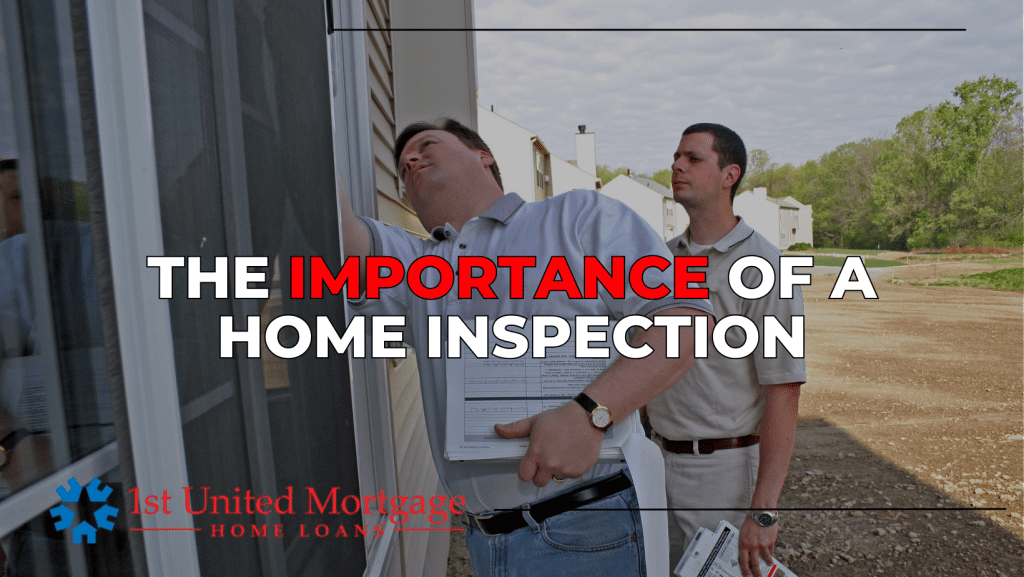
When embarking on the journey to purchase a home, one of the most crucial steps is often overlooked: the home inspection. At 1st United Mortgage, we emphasize the importance of this step to ensure your investment is sound and your future home is safe. Let’s delve into why a home inspection is indispensable and what you can expect from this process.
What is a Home Inspection?
A home inspection is a thorough assessment of a property’s condition conducted by a certified professional. Inspectors examine various elements of the home, including structural components, electrical systems, plumbing, heating and cooling systems, roofing, and more. The goal is to identify any existing or potential issues that could affect the safety, functionality, and value of the property.
Why You Need a Home Inspection
1. Uncover Hidden Issues
Many problems in a home aren’t visible to the untrained eye. A home inspection can reveal hidden issues such as foundation cracks, mold infestations, roof damage, or outdated electrical wiring. Identifying these problems before you purchase can save you from unexpected and often costly repairs.
2. Negotiation Power
A detailed home inspection report can provide you with leverage during the negotiation process. If significant issues are found, you can request repairs or negotiate a lower purchase price to reflect the cost of addressing these problems. This ensures you’re not overpaying for a property that requires substantial work.
3. Peace of Mind
Buying a home is a significant financial commitment. A thorough inspection provides peace of mind by confirming that the property is in good condition and free from major defects. This confidence can help you move forward with your purchase without second-guessing your decision.
4. Future Planning
Even if the inspection reveals minor issues, it allows you to plan for future repairs and maintenance. Understanding the condition of the home’s systems and components helps you budget for necessary improvements, ensuring the longevity and safety of your investment.
5. Safety Assurance
A home inspection can identify safety hazards such as faulty electrical wiring, carbon monoxide leaks, or structural weaknesses. Addressing these concerns before moving in protects you and your family from potential dangers, making your new home a safer place to live.
What to Expect During a Home Inspection
1. Preparation
Before the inspection, prepare a list of any concerns you have about the property. Share this list with the inspector so they can address these areas during their assessment.
2. The Inspection Process
The inspection typically takes a few hours, depending on the size and condition of the property. It’s beneficial to accompany the inspector during this time. They can explain their findings, show you the locations of key systems, and provide insights into the home’s condition.
3. The Inspection Report
After the inspection, you’ll receive a detailed report outlining the inspector’s findings. This report will include descriptions of any issues discovered, photographs, and recommendations for repairs or further evaluations. Review this report carefully and discuss any concerns with your real estate agent.
Choosing the Right Home Inspector
1. Qualifications and Certifications
Ensure that the home inspector is a member of a reputable organization such as the American Society of Home Inspectors (ASHI) or the International Association of Certified Home Inspectors (InterNACHI). These organizations have strict standards and require members to adhere to a code of ethics and continuing education.
2. Experience
Look for an inspector with significant experience in the field. An experienced inspector is more likely to spot potential issues and provide a comprehensive assessment.
3. References and Reviews
Ask for references from past clients and read online reviews. This can give you an idea of the inspector’s reliability, thoroughness, and professionalism.
Additional Inspections to Consider
While a standard home inspection covers many aspects of the property, there are additional specialized inspections you may want to consider, such as:
– Pest Inspection: Identifies any signs of pest infestations, such as termites or rodents, which can cause significant damage.
– Radon Inspection: Measures the levels of radon gas in the home, which can pose health risks.
– Mold Inspection: Detects the presence of mold, which can affect indoor air quality and health.
– Septic System Inspection: Evaluates the condition of the septic system, which is crucial for homes not connected to a municipal sewer system.
The Home Inspection Contingency
A home inspection contingency is a clause in the purchase contract that allows the buyer to back out or renegotiate the terms if significant issues are discovered during the inspection. This clause protects you from purchasing a property with unforeseen problems and provides the flexibility to address any concerns that arise.
Common Questions About Home Inspections
Do I Need a Home Inspection for a New Home?
Yes. Even newly built homes can have issues, such as construction defects or incomplete work. An inspection ensures that everything is up to code and that the builder has met all necessary standards.
Is a Home Inspection Worth the Cost?
Absolutely. The cost of a home inspection, typically ranging from $300 to $500, is a small price to pay for the peace of mind and potential savings it offers. The inspection can uncover issues that, if addressed, could cost thousands of dollars in repairs.
A home inspection is a critical step in the home-buying process that ensures your investment is protected and your new home is safe. At 1st United Mortgage, we are dedicated to helping you navigate every aspect of purchasing your dream home.
For expert guidance and support in securing your mortgage, contact us today at (931) 548-1985 or visit our website. Let us help you achieve your dream of homeownership with confidence and peace of mind.
